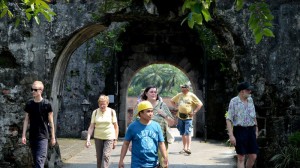UN exec pushes for ‘open-skies’ to boost tourism worldwide
LEGAZPI CITY, Philippines — The secretary general of the United Nations World Tourism Organization (UNWTO) urged world leaders to open their skies and borders in order to bring people closer together and drive economic growth.
Air connectivity—or opening the borders and skies of every country to tourists—would improve and sustain economic growth, UNWTO secretary general Taleb Rifai said here on Saturday, the penultimate day of the weeklong UNWTO conference at Oriental Hotel here.
The air connectivity program was among the significant items on the agenda of the 26th Joint Meeting of the UNWTO Commission for East Asia and the Pacific and the UNWTO Commission for South Asia, a related conference also held here on Saturday.
Rifai also presided over the UNWTO-Asean International Conference on Tourism and Climate Change-Global Code of Ethics for Tourism (GCET) that representatives from member-nations convened on Sunday.
President Benigno Aquino is expected to grace Monday’s closing rites of the UNWTO conferences.
Article continues after this advertisementAs a top UNWTO official, Rifai pictured tourism as a powerful force in the world, saying “I want billions of people to travel every year going to other countries… This way it would be an opportunity for people to be together, understand each other and promote their respective nations, thus breaking the barrier that separates them.”
Article continues after this advertisementTourism development deals with two basic aspects—the natural environment and the natural heritage. It would be in the best interest of the industry to keep the environment clean and protected, he said.
“We believe that tourism can be one of the vehicles versus climate change. That is why we are meeting here to set up policies that would counter the effects of climate change and to make people aware of the value of the environment they have to protect.”
As for the implementation of a Global Code of Ethics on tourism, the UNWTO official said the code was approved and adopted by the United Nations General Assembly in 2003. The code has 10 principles to cover the economic, social, cultural and environmental components of travel and tourism.
According to Rifai, the code has strict rules against abusing the environment; building tourism facilities that promote child labor and trafficking of women; destroying cultural artifacts, citing as an example the poaching in Africa; and any tourism market that would destroy lives and communities.
RELATED STORIES
Aquino signs EO to adopt ‘open skies’ policy
Philippines will capitalize on open skies to boost tourism, says DOT chief
